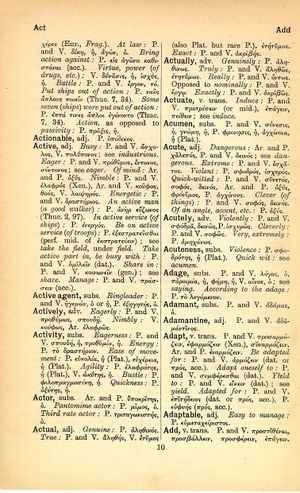acute: Difference between revisions
From LSJ
ἤκουσεν ἐν Ῥώμῃ καὶ ἀρσένων ἑταιρίαν εἶναι → he heard that there was also a fellowship of males in Rome (Severius, commentary on Romans 1:27)
(6_1) |
(D_1) |
||
| Line 16: | Line 16: | ||
{{Lewis | {{Lewis | ||
|lshtext=<b>ăcūte</b>: adv., v. [[acuo]],<br /><b>I</b> P. a. fin. | |lshtext=<b>ăcūte</b>: adv., v. [[acuo]],<br /><b>I</b> P. a. fin. | ||
}} | |||
{{Gaffiot | |||
|gf=<b>ăcūtē</b>¹² ([[acutus]]), de façon aiguë, perçante, [[fine]], pénétrante : [avec l’idée de penser] Cic. Off. 1, 56 ; [de raisonner, disserter] Cic. Fin. 3, 2 ; Tusc. 5, 28 ; [de parler, d’écrire] Cic. Br. 108 ; Læl. 6 ; Verr. 2, 2, 20, etc. || [[acute]] cernere Lucr. 4, 810, voir distinctement (distinguer nettement) ; sonare Cic. Rep. 6, 18, avoir un son aigu ; audire [[Sol]]. 19, 11, avoir l’ouïe [[fine]] || -[[tius]], tissime Cic. | |||
}} | }} | ||
Revision as of 06:30, 14 August 2017
English > Greek (Woodhouse)
adj.
Dangerous: Ar. and P. χαλεπός, P. and V. δεινός; see dangerous.
Extreme: P. and V. ἔσχατος.
Quick-witted: P. and V. συνετός, σοφός, δεινός, Ar. and P. ὀξύς, φρόνιμος, P. ἀγχίνους.
Clever (of things): P. and V. σοφός, δεινός.
Of an angle, accent, etc. P. ὀξύς.
Latin > English (Lewis & Short)
ăcūte: adv., v. acuo,
I P. a. fin.
Latin > French (Gaffiot 2016)
ăcūtē¹² (acutus), de façon aiguë, perçante, fine, pénétrante : [avec l’idée de penser] Cic. Off. 1, 56 ; [de raisonner, disserter] Cic. Fin. 3, 2 ; Tusc. 5, 28 ; [de parler, d’écrire] Cic. Br. 108 ; Læl. 6 ; Verr. 2, 2, 20, etc.

